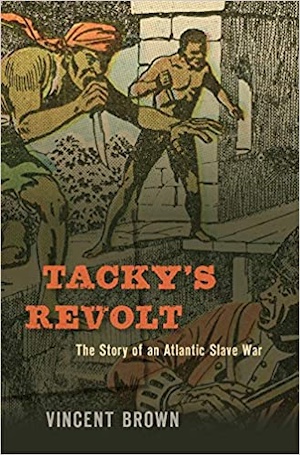By Fred H. Lawson
Intricate political, economic, and cultural connections among far-flung parts of the world have existed long before the present moment. Throughout the late eighteenth century, armed conflict in West Africa, imperial rivalry in the Caribbean Sea, and class-related social struggle inside Jamaica were tightly intertwined. Vincent Brown aspires not only to remind contemporary readers of this crucial fact, which has most often been occluded by the professional imperatives of academic historians, but also and more importantly to clarify the operative analytical linkages.
Tacky’s Revolt largely succeeds in the first of these two ambitious projects. Vicissitudes of large-scale warfare among the great powers of West Africa are shown to have accompanied significant developments in the long-running contest among Great Britain, Spain, and France for dominance over the West Indies. Battles involving the Asante, Akwamu, Fante, and other key African polities transformed during the second half of the seventeenth century so as to make “the employment of guns the decisive element in war.” This fundamental change in weapons technology boosted trade with European gun-manufacturing countries, and prompted West Africa’s rulers to capture greater numbers of human beings to pay for the new armaments. The sharp increase in the supply of captives enabled estate-holders in Jamaica to replace indentured White laborers with enslaved Black persons, and the resulting plunge in production costs made Jamaica the most profitable component of the British Empire.
On the other side of the coin, periodic rebellions in Jamaica posed severe threats to the stability of global trade and the orderly accumulation of capital, since the island constituted a primary node of what Immanuel Wallerstein calls the capitalist world-system. Local disruptions therefore had a direct impact on parliamentary politics and economic prosperity in London, as well as on the ability of British officials to maintain their authority over the rest of the extensive imperial domain. Only by situating seemingly isolated revolts in the context of the international arena as a whole, or at least the Atlantic Ocean littoral, can we appreciate the inherent complexity of historical eras.
How exactly such complexity works is less cogently articulated. Detailed narratives are presented concerning the activities of British adventurers cum diplomats cum entrepreneurs along the West African coast, the armed uprising that occurred in northern Jamaica in April of 1760, and the considerably more widespread revolt that erupted in western Jamaica a month later. Yet each topic is covered in isolation, with readers left to wonder how they might best be fitted together. Occasional assertions that “cultural affinity, migratory experience, and ceaseless social struggle combined in particular and proximate locations to determine the course of events” do little to elucidate the pertinent explanatory processes.
One perennial problem in writing the history of subaltern actors is the lack of reliable source material. This study confronts the difficulty by proposing to “read [the existing] records both against the grain, to investigate things the sources never meant to illustrate, and along the grain, to note how they constrain and shape our knowledge.” Such subtle interpretive strategies remain implicit at best, and anyone unfamiliar with current scholarship on the Jamaican past will be hard-pressed to determine the extent to which Brown’s interpretations differ from standard accounts. What does become evident is the frequency with which the text remarks that some actor or another “must have felt some trepidation,” “surely reflected on British power,” “probably paid close attention,” or “must have seen an opportunity.” This sort of speculative analysis moves the story along, but leaves readers questioning whether the author might be attributing too much of his own understandings and sensibilities to protagonists who existed in profoundly different circumstances.
Fred H. Lawson (ΦBK, Indiana University) is Professor of Government Emeritus of Mills College and a sometime Visiting Fellow of St Antony’s College, Oxford.




